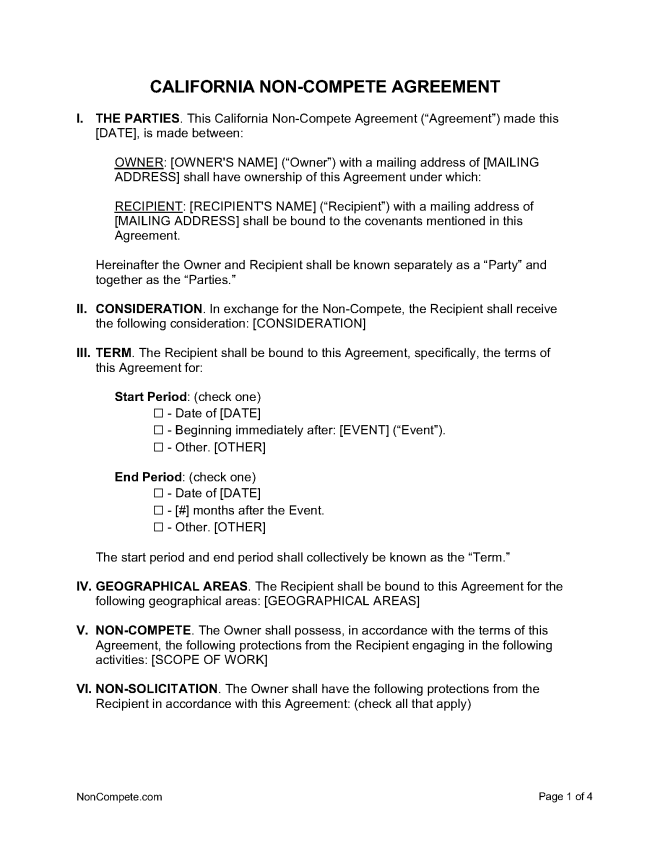A California non-compete agreement is a contractual limitation on a party’s ability to practice a trade, profession, or business to which the party would otherwise be allowed. Non-compete agreements are typically called “covenants not to compete” in California, and they are highly restricted.
They are not permitted in employment agreements and only under limited circumstances when created in the context of the sale of a business. It is also uncertain whether California has a “trade secrets exception” as in some other states.
Table of Contents |
Are Non-Competes Enforceable in California?
Covenants not to compete are generally unenforceable. (Fillpoint, LLC v. Maas (2012)). The only exceptions are:
- A person selling all or most of the goodwill of a business, through the sale of ownership interest or assets of a company or business subsidiary, may agree with the buyer to refrain from running a similar business within a set geographic area where the buyer, or a person getting title to the business from the buyer, is operating. Cal. Bus. & Prof. Code § 16601.
- In dissolving or dissociating a business organized as a partnership, any partner may agree to refrain from carrying on a similar business within a specified geographic area. Cal. Bus. & Prof. Code § 16602.
- In dissolving or dissociating a business organized as a limited liability company (LLC), any member may agree to refrain from carrying on a similar business within a specified geographic area. Cal. Bus. & Prof. Code § 16602.5.
Good Will
There must be a clear indication that in the sale, the parties considered goodwill as a component of the sales price — that the purchaser was entitled to protection from competition from the seller that would have reduced the value of the property acquired. (Hill Med. Corp. v. Wycoff (2001))
This means considering the circumstances of the entire transaction, including whether the sale constituted a substantial interest in the corporation and the sales price. Paying fair market value for stock makes it more likely that the transaction will be deemed to have included goodwill. (Hill Med. Corp. v. Wycoff (2001))
Trade Secrets
Although states that limit the use of non-compete agreements tend to allow them to protect trade secrets, it is unclear whether a “trade secret exception” exists in California. (Dowell v. Biosense Webster, Inc. (2009)) (“Although we doubt the continued viability of the common law trade secret exception to covenants not to compete, we need not resolve the issue here.”)
While the ability of a company to protect trade secrets through a non-compete agreement is uncertain, they can protect them through lawsuits under the state’s Uniform Trade Secrets Act or the Unfair Competition Law. (The Retirement Grp. v. Galante (2009)).
Prohibited Professions
Lawyers may not sign partnership, employment, or settlement agreements limiting their right to practice, except those contingent upon retirement. CA ST RPC Rule 5.6
However, Business and Professions Code Section 16602 is understood to allow agreements that require licensed professionals departing a partnership to pay or forgo a specified amount of money should they choose to compete against former partners.
For lawyers, the amount at the time of the agreement should be what is reasonably calculated to compensate the firm for losses that may be caused by the withdrawing partner’s competition with the firm. Howard v. Babcock (1993).
Similar exceptions are available to accountants (Farthing v. San Mateo Clinic (1956)) and doctors (South Bay Radiology Medical Associates v. Asher (1990)).
Terminating an Employee
Terminating an employee or officer bound by a non-compete agreement valid under a recognized statutory exception does not necessarily release the employee from the non-compete provisions, even if the termination was wrongful. Vacco Indus., Inc. v. Van Den Berg (1992).
Burden of Proof
There is no statutory or case guidance about which party has the burden of proof in determining the enforceability of a non-compete in California. However, state law provides, “every contract by which anyone is restrained from engaging in a lawful profession, trade, or business of any kind is to that extent void.” It may be especially challenging to prove that a restraint of trade is valid. Cal. Bus. & Prof. Code § 16600.
Continued Employment (Consideration)
While many states skeptical of non-compete agreements permit an exception if the agreement is offered as part of an employment contract, California courts have consistently found non-compete agreements in the employment context to be against the state’s public policy. (Edwards v. Arthur Anderson LLP (2008)).
Maximum Term
Perhaps because non-compete agreements are so limited in California, there is no statutory or case law guidance on the maximum term for a non-compete agreement. When a non-compete agreement is sought under the goodwill exception, it may only cover a “specified geographic area” and continue as the competing business is in effect. Cal. Bus. & Prof. Code § 16601.
Blue Penciling
An invalid non-compete clause in the employment context will not be reformed or “blue-penciled” to make it fit within the narrow statutory exceptions. (Kolani v. Gluska (1998)).
However, because California’s non-compete statute says that agreements that restrict trade outside of the specified exceptions are “to that extent void,” non-compete agreements associated with the sale of a business may be reformed under California’s rules on severability in contracts. (Swenson v. File (1970))
